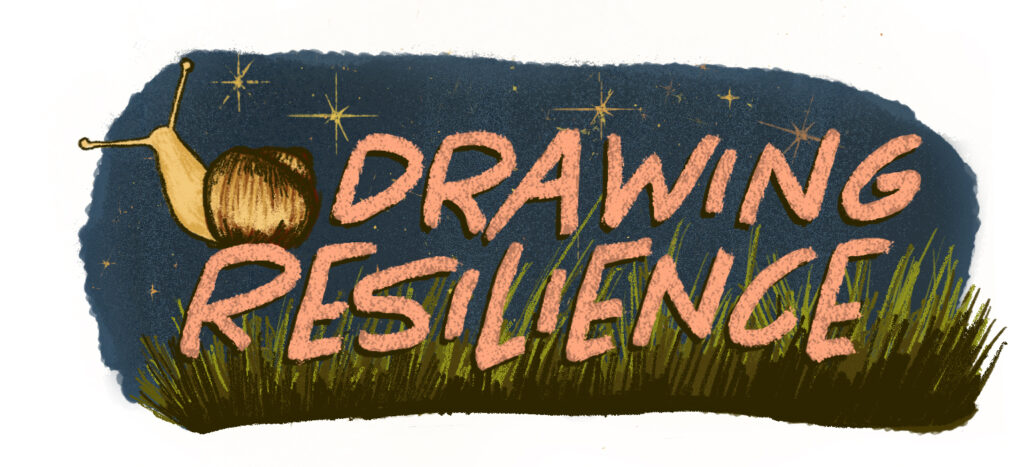

Drawing Resilience: Dahr Jamail
Illustrations and interview by Nhatt Nichols
In late 2003, weary of the overall failure of the US media to accurately report on the realities of the war in Iraq for the Iraqi people, Dahr Jamail went to the Middle East to report on the war himself. After experiencing PTSD, he changed his focus to anthropogenic climate disruption and the environment.
His book, The End of Ice, is one of Smithsonian Magazine’s 10 Best Science Books of 2019 and was a finalist for the PEN/E.O. Wilson Literary Science Writing Award in 2020.
Dahr’s most recent book, We Are the Middle of Forever, co-edited with Stan Rushworth, is a powerful, intimate collection of conversations with Indigenous Americans on the climate crisis and the Earth’s future.
He also hosts Holding the Fire, a podcast featuring interviews with leaders worldwide, uncovering Indigenous ways of reckoning with environmental and societal breakdown.
Nhatt:
Could you tell me a little about your shift to rural life after your experiences as a war correspondent?
Dahr:
It’s been very, very present for me lately with Gaza. I went to Iraq because I was heartbroken and enraged by the demonization of the Iraqi people and all Arabs; I’m an Arab American. I went because I felt a deep solidarity with the Iraqi people and wanted to do what I could to portray their side of the story. There was US imperialism and colonization happening in broad daylight, and human beings were being killed because of it. I thought that if I did a good enough job, people here would see the information and care and want to help end the war. It did have that effect on a lot of people, but most people didn’t want to see that side of the story.
It turned into ten years of going in and out of Iraq, covering the refugee crisis at length. This is US imperialism; you’re not going to stop it. So, how am I going to take care of myself while I try to help people?
Then, I did in-depth science reporting on the climate; our system is collapsing. Ultimately, that’s a good thing, but for a lot of people, there’s going to be a lot of strife and suffering in that process.
So, how can I best situate myself to live during this time?
I looked at the projections in the contiguous 48 states of where’s going to be the best place to live for the radically changing climate. It was either the Pacific Northwest or the far Northeast, and I’ve always been a West Coast guy. You could still get a chunk of land at the time, and I knew I wanted to garden and have chickens.
Nhatt:
You were dealing with a lot of heaviness from war and climate change reporting. It was time to find internal resilience, for you to find networks and connections.
Dahr:
I have severe PTSD, which is something you learn to live with, so I don’t do well in crowded places. I needed space; I needed quiet. And I needed the healing that only comes from being out in nature regularly. Being surrounded by trees, lushness, green, birds, and mostly good neighbors. That was absolutely critical.
Nhatt:
Another way you’re finding resilience is by interviewing indigenous leaders.
Dahr:
In one chapter [of We Are in the Middle of Forever] a Potawatomi scholar talks brilliantly about kinship. He talks a lot about linear and nonlinear time. He uses his great example of playing chess versus timed chess. You’re not going to be able to see all the different possibilities. And you’re going to be more prone to mistakes. Versus if you have unlimited time, it’s going to be a deeper game; it’s going to take way longer. It’s going to call out everything from each player. It’s a completely different paradigm. And that’s what we’re talking about.
Nhatt:
You have a podcast (Holding the Fire) where you speak with Indigenous thought leaders.
How are you finding ways of bringing indigenous thought into your own life and community?
Dahr:
The most important part of that is kinship. How did indigenous people survive genocide? How do they survive ongoing erasure? They couldn’t even openly practice their spiritual beliefs; it was a crime to have a sweat until after 1978. How do you survive that? Kinship and community. Not everybody wants it; I’ve learned that the hard way. I have neighbors who don’t want it, and it’s respectful not to try to force it upon them. But most people do want it. So, foster those relationships with respect, reciprocity, transparency, and, most importantly, responsibility. It is my responsibility that you feel that you can trust me and that I won’t do something unpredictable that might affect you. I’m going to talk with you about it first and then they’re going to do the same thing with me. All that is building kinship; sometimes, we go weeks without seeing each other. But I know if I need something, I can ask them, and they know the same thing.
Get this and other rural content in your inbox with the Rural Assembly newsletter.







